正反解读动词的时态、语态
图片预览

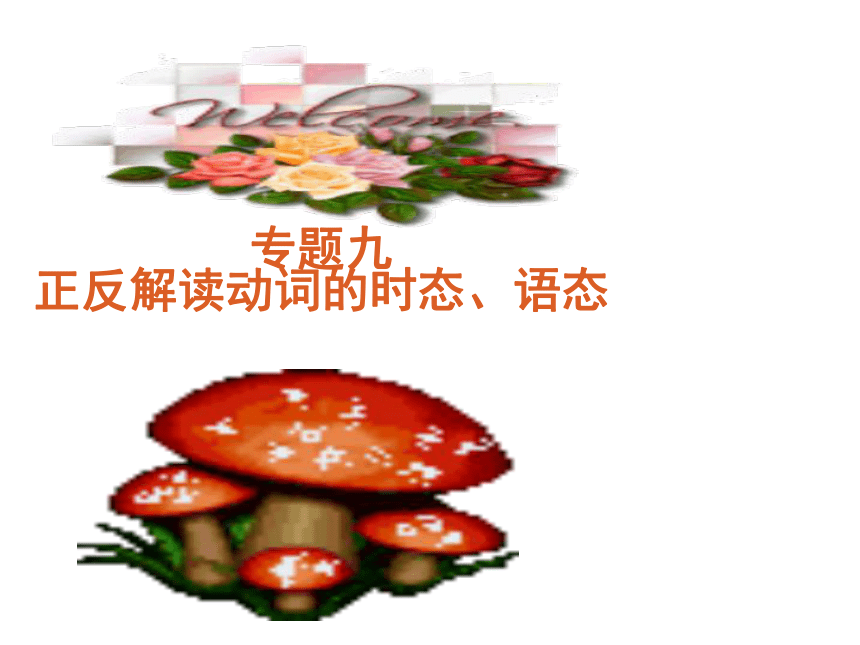
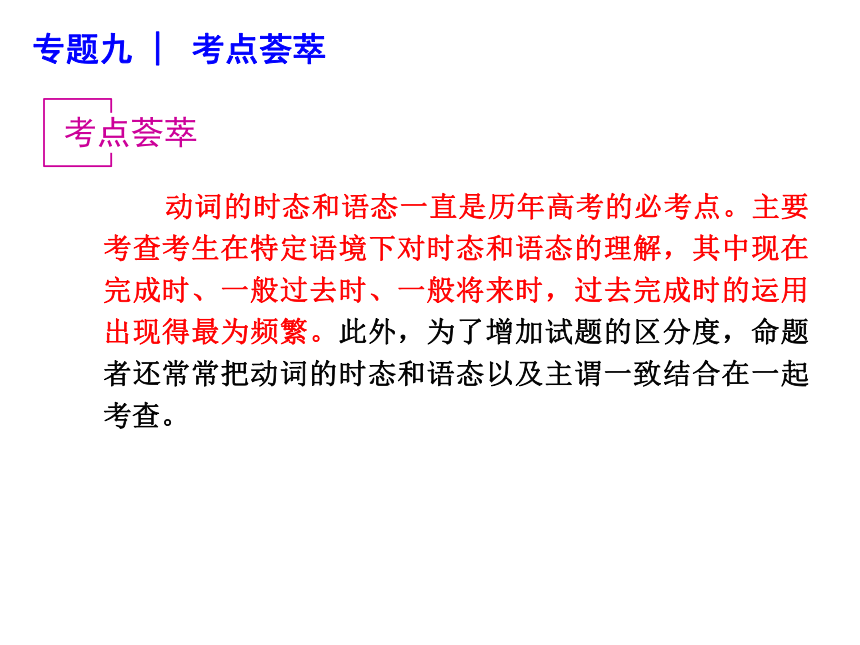
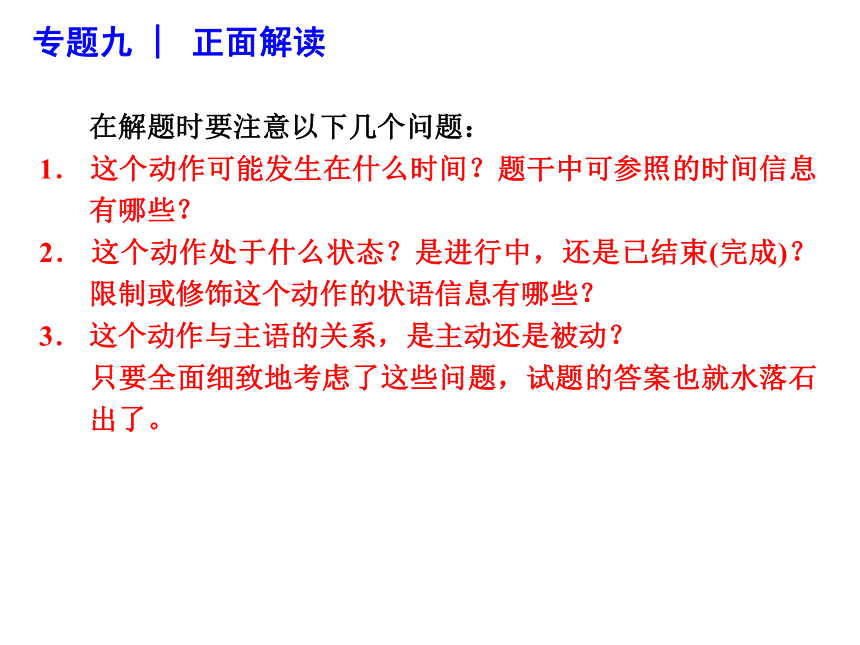
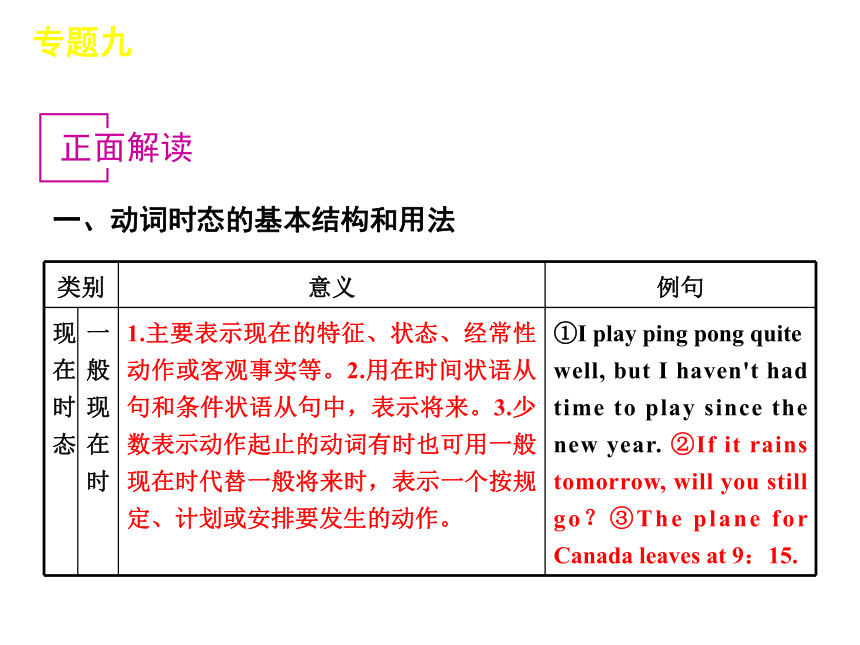
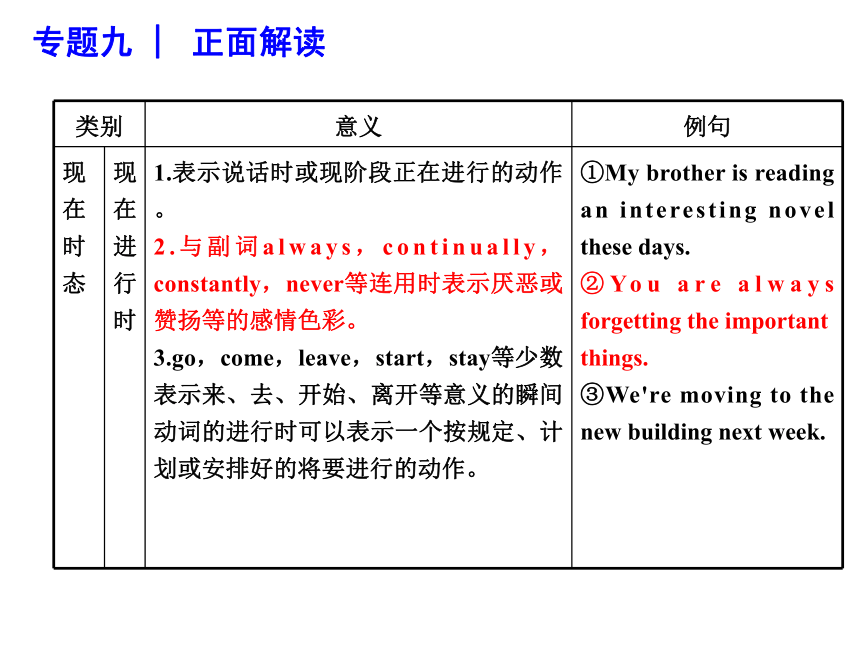
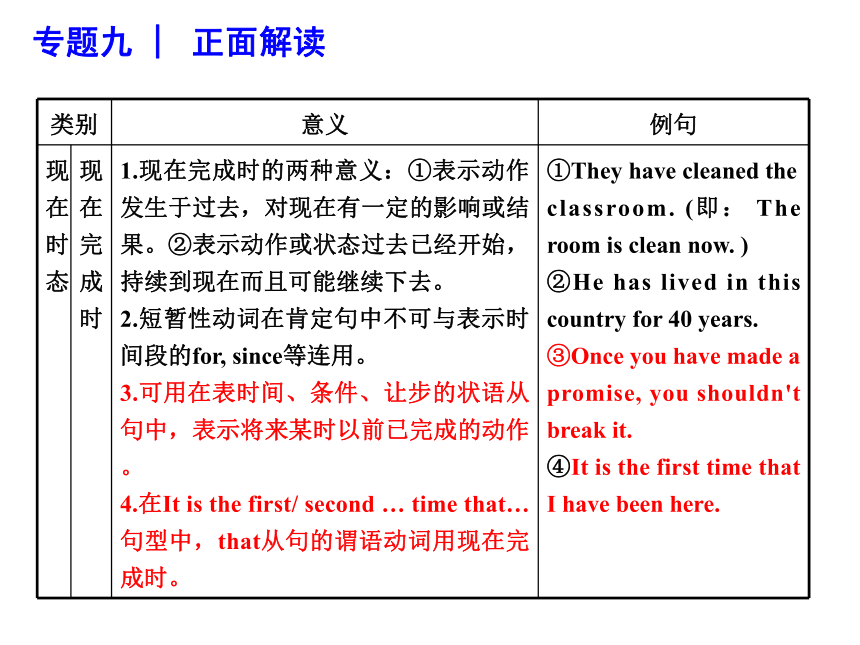
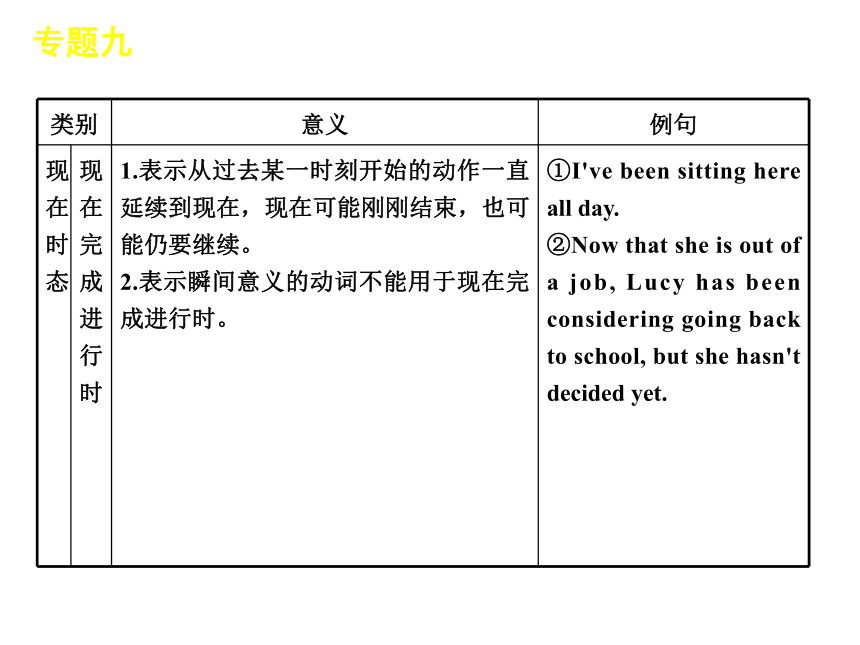

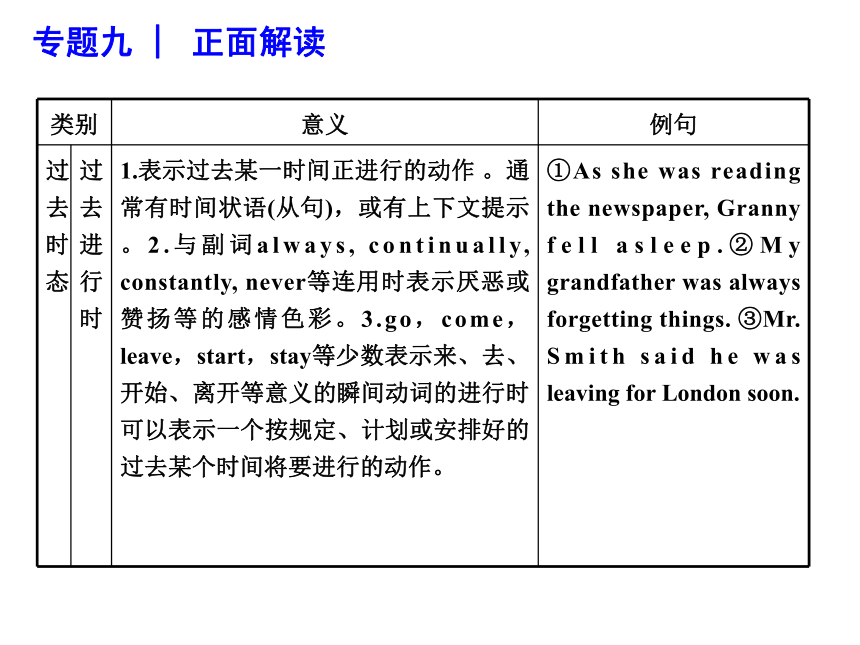
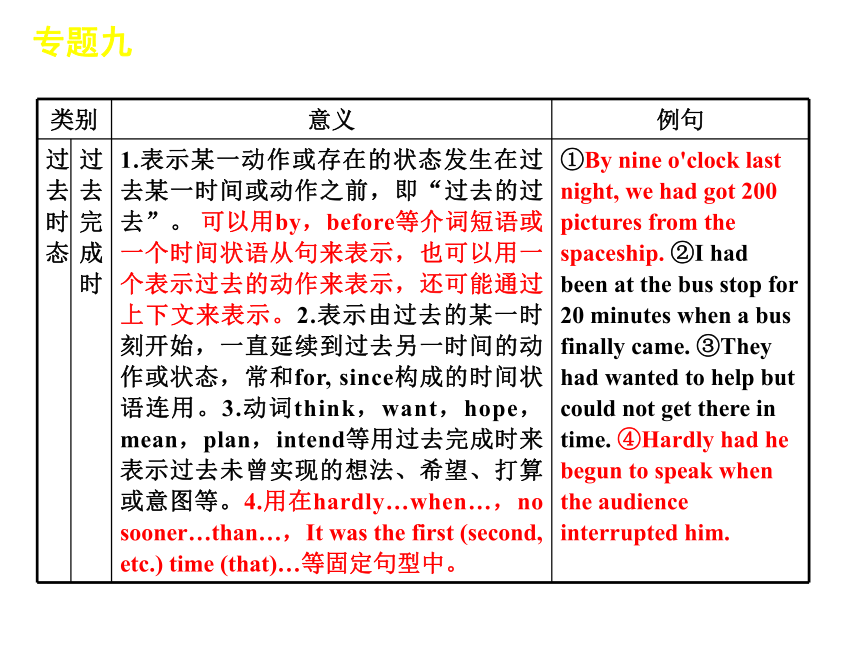
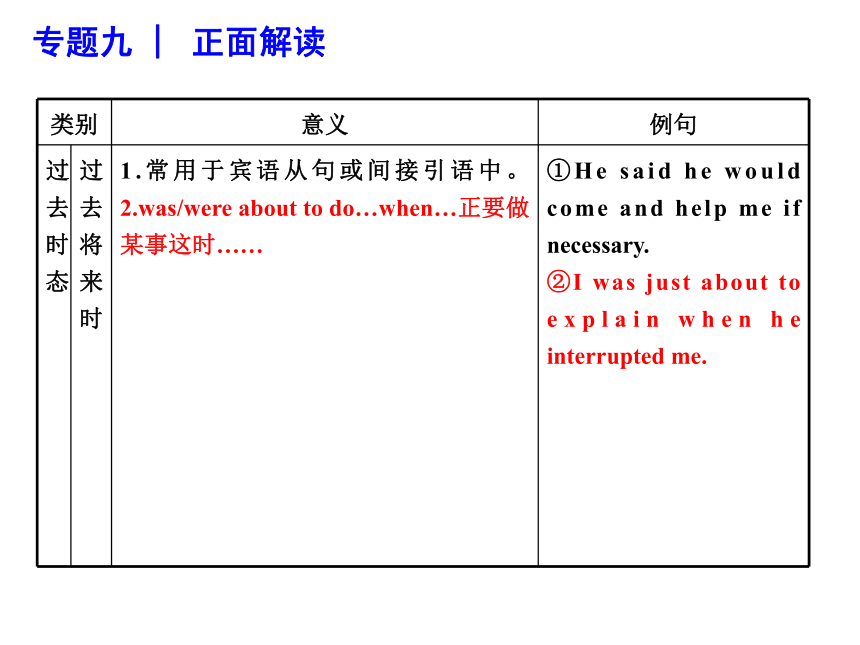
文档简介
课件64张PPT。目 录专题一 正反解读冠词
专题二 正反解读名词
专题三 正反解读代词
专题四 正反解读形容词、副词
专题五 正反解读介词
专题六 正反解读动词和动词短语
专题七 正反解读非谓语动词
专题八 正反解读情态动词和虚拟语气
专题九 正反解读动词的时态、语态
专题十 正反解读定语从句
专题十一 正反解读名词性从句
专题十二 正反解读状语从句
专题十三 正反解读特殊句式
专题十四 正反解读主谓一致与数词【人教课标版】高考英语一轮复习精品课件 — 语法专题语法专题专题九
正反解读动词的时态、语态
专题九 │ 考点荟萃 动词的时态和语态一直是历年高考的必考点。主要考查考生在特定语境下对时态和语态的理解,其中现在完成时、一般过去时、一般将来时,过去完成时的运用出现得最为频繁。此外,为了增加试题的区分度,命题者还常常把动词的时态和语态以及主谓一致结合在一起考查。 在解题时要注意以下几个问题:
1. 这个动作可能发生在什么时间?题干中可参照的时间信息有哪些?
2. 这个动作处于什么状态?是进行中,还是已结束(完成)?限制或修饰这个动作的状语信息有哪些?
3. 这个动作与主语的关系,是主动还是被动?
只要全面细致地考虑了这些问题,试题的答案也就水落石出了。
专题九 │ 正面解读一、动词时态的基本结构和用法
专题九 │ 正面解读
专题九 │ 正面解读
专题九 │ 正面解读
专题九 │ 正面解读
专题九 │ 正面解读
专题九 │ 正面解读
专题九 │ 正面解读
专题九 │ 正面解读
专题九 │ 正面解读
专题九 │ 正面解读
专题九 │ 正面解读
专题九 │ 正面解读二、几种易混时态的辨析
1. 一般现在时与现在进行时
一般现在时表示经常性的、习惯性的或状态性的行为。 而现在进行时则具有进行性、未完成性和暂时性的特点。如:
On the wall hangs a picture painted by Qi Baishi.
This is not my coat. Mine is hanging behind the door.
专题九 │ 正面解读 如:
[2014·重庆卷] The palace caught fire three times in the last century,and little of the original building ________ now.
A.remains
B.is remained
C.is remaining
D.has been remained
【解析】 A 考查动词用法及时态。remain作不及物动词用,表示“剩下,仍有”,只能用于主动语态,不可直接跟宾语。结合语境应用一般现在时表示现状。专题九 │ 正面解读2. 一般过去时和现在完成时
一般过去时所表达的事件与现在无关。而现在完成时则强调对现在的影响和结果。如:
I stayed in Beijing for five days. Then I went to America. (I am not in Beijing now. )
I have stayed in Beijing for five days and haven't decided where to go next. (I am still in Beijing now and don't know where to go next.)专题九 │ 正面解读 [2013·北京卷] —I'm sorry,but I don't quite follow you. Did you say you wanted to return on September 20?
—Sorry,I ________myself clear. We want to return on October 20.
A.hadn't made
B.wouldn't make
C.don't make
D.haven't made
【解析】 D 本题考查时态和情景交际。答句句意为:抱歉,我还没有把我的意思表达明白,强调对现在造成的影响,用现在完成时态。专题九 │ 正面解读3. 一般过去时和过去进行时
一般过去时表示发生在过去的动作或过去存在的状态。过去进行时则表示在过去某个时间点或时间段正在做某事。进行时具有进行性、未完成性和暂时性的特点。专题九 │ 正面解读 如:
I read a book last month. (书已经在过去某个时间点读完)
I was reading a book last month. (书未读完)
— Has Sam finished his homework today?
— I have no idea. He ________it this morning.
A.did B.has done
C.was doing D.had done
【解析】 C 此题容易误选A。根据I have no idea这一关键信息可知,说话者对是否完成并不知道,因此用进行时,表示今天上午在做。专题九 │ 正面解读4. 一般过去时和过去完成时
判断是不是过去完成时应先从时间轴上找到表示“过去”的时间点或动作①,然后判断在这个时间点或动作之前还有没有另一个动作②,并且判断该句是否强调②发生在①前。
The moment I got home, I found I had left my jacket on the playground.专题九 │ 正面解读5. 完成时和完成进行时的用法比较
现在完成时和过去完成时分别表示某一动作持续到现在或过去某一时间。现在完成进行时和过去完成进行时虽然也表示一个动作持续到现在或过去某一时间,但更强调动作的持续性。完成时强调动作的结果,完成进行时强调动作的延续。专题九 │ 正面解读 如:
(1) —Why does the river smell terrible?
—Because the water________.
A.have polluted
B.is being polluted
C.has been polluted
D.have been polluted
【解析】 C 考查完成时和完成进行时的用法和主谓一致。根据问句可知所填动词表示过去发生的动作对现在产生的影响,时态用现在完成时,动词与主语是被动关系,用被动语态。主语是the water,谓语动词用单数,选C。专题九 │ 正面解读(2) He ________ articles for our newspaper these years, and he ________about 40 articles.
A.has written;has written
B.has been writing;writes
C.is writing;has been writing
D.has been writing;has written
【解析】 D 考查完成时和完成进行时的用法。由句意知“这些年他一直在写”,用has been writing;“已写完了”用has written。专题九 │ 正面解读三、被动语态
动词的语态反映主语与谓语动词之间的一种关系。动词的语态有两种:主动语态和被动语态。当句子的主语是谓语动词所表示的动作的执行者时,谓语动词用主动语态;当句子的主语是谓语动词所表示的动作的承受者时,谓语动词用被动语态。在主动语态中,句子通过谓语动词的不同形式体现出不同的时态形式;被动语态由“助动词be + 过去分词”构成,不同的时态通过 be 的不同形式体现。其被动语态构成方法与普通的及物动词的被动语态的构成方法相同。专题九 │ 正面解读专题九 │ 正面解读专题九 │ 反面解读专题九 │ 反面解读1. —Hi, Lucy, you look tired.
—I'm really tired. I ________the living room all day.
A.painted
B.had painted
C.have been painting
D.have been painted
【误】 学生容易分辨不清C与D的区别,而误选D。
【正】 C 表示我一整天都在刷房子,应该用现在完成进行时。专题九 │ 反面解读2. Nancy is not coming tonight. But she ________!(promise)
【误】 But she has promised.
【正】 But she promised.
【解析】 Nancy“答应要来”这个动作应该发生在过去,是过去作出的承诺,前文已告诉我们“她不来了”,因此诺言已跟现在没有关系,只是过去的一个动作。专题九 │ 反面解读3. 托尼给我打电话时,我刚完成工作,要开始洗澡。
【误】 When Tony phoned me I had just finished my work and started to take a shower.
【正】 When Tony phoned me I had just finished my work and was starting to take a shower.
【解析】 从关键信息I had just finished my work可以看出是“正要开始洗澡”应该是进行时,was starting 可以表示马上就要进行的动作;而started表示“开始了”。专题九 │ 反面解读4. I don't really work here; I ________until the new secretary arrives.
A.just help out
B.have just helped out
C.am just helping out
D.will just help out
【误】 此题易受第一句话的影响,而误选A。
【正】 表示我现在只是在临时帮忙,是现在正在进行的动作,选C。
【解析】 一般现在时表示现在的、经常性的行为或状态,而现在进行时表示正在进行的、暂时性的动作。专题九 │ 反面解读5. 很多的鸟类正被人们捕杀。
【误】 Many birds are killed now.
【正】 Many birds are being killed now.
【解析】 现在进行时的被动语态结构要完整,不能遗漏其中的助动词,导致时态错误。
专题九 │ 反面解读1. [上海卷] The church tower which ________ will be open to tourists soon. The work is almost finished.
A.has restored
B.has been restored
C.is restoring
D.is being restored
【解析】 D 本题考查被动语态。restore意为“修复”,而最后一句表明工程还未完成,因此为正在修复中,选D。专题九 │ 实战演练2. [·北京卷] John was given the same suitcase his father and grandfather________ with them to school.
A.took B.had taken
C.were taking D.would take
【答案】 B
3. [·辽宁卷] Excuse me, Marcia, a reporter from Vanity Fair________ all day. Could you speak to her now?
A.phones B.has phoned
C.has been phoning D.phoned
【解析】 C 考查现在完成进行时。由all day可以看出一直在打电话,此时仍然在打,过去发生的动作持续到现在并仍在进行,选C。专题九 │ 实战演练4. [天津卷] My parents ________ in Hong Kong. They were born there and have never lived anywhere else.
A.live B.lived C.were living D.will live
【解析】 A 考查时态。后句意思为:他们出生在香港,从来没有在别的地方住过。由此可知前句“一直在香港住”,时态用一般现在时,说明事实,选A。
专题九 │ 实战演练5. [·江苏卷]
— Ann is in hospital.
— Oh, really? I _______know. I _______go and visit her.
A.didn't; am going to
B.don't; would
C.don't; will
D.didn't; will
【解析】 D
由答语中的“Oh, really?”可以看出,“我”是刚刚知道的,所以用I didn't know表示现在之前不知道。A项中的am going to表示“说话时早有的打算”,而D项中的will则表示“说话时临时的打算”。专题九 │ 实战演练6.[上海卷]
During the period of recent terrorist activities, people ______ not to touch any unattended bag.
A.had always been warned
B.were always being warned
C.are always warning
D.always warned
【解析】 B
根据时间状语可知是指过去,be always doing sth. 表示“一种感彩”,并且人们与警告之间是被动的 关系,选B。
专题九 │ 实战演练7.He ____________ football regularly for many years when he was young.
A.was playing B.played
C.has played D.had played
【解析】 B
考查考生对题干中句子含义的理解以及对动词时态的掌握情况。由题干中的“for many years”很多同学推断出应为现在完成时,但“when he was young”这个时间状语表明他打球是过去时,未持续到现在。由“regularly” 可知他过去经常打球,是一种过去的习惯性的动作,选B。专题九 │ 实战演练8. [2013·全国卷Ⅱ]
Linda,make sure the tables ________ before the guests arrive.
A.be set B.set
C.are set D.are setting
【解析】 C 考查动词时态语态。
make sure意为“确信,确保”,
set tables意为“摆放桌子”,结合语境应用被动形式。专题九 │ 实战演练9. [2013·全国卷Ⅱ] Excuse me. I________ I was blocking your way.
A.didn't realize
B.don't realize
C.haven't realized
D.wasn't realizing
【解析】 A 考查动词时态。这里应用一般过去时表示说话之前“没有意识到”。专题九 │ 实战演练10.My friend went to Canada three years ago. He________ there for a few months and then went to America.
A.was living B.has lived
C.was lived D.lived
【解析】 D 句意为:我的朋友三年前去了加拿大,他在那里住了几个月,然后去了美国。由句意可知,住在加拿大这个情况发生在过去,且已经结束,故用一般过去时。
专题九 │ 实战演练11.[四川卷]
— When shall we restart our business?
— Not until we ________ our plan.
A.will finish B.are finishing
C.are to finish D.have finished
【解析】 D 考查动词时态。
状语从句用现在时代替将来时,这里表示计划完成后,所以用现在完成时。专题九 │ 实战演练12.—Have you read the book called Waiting for Anya?
—Who ________it?
A.writes B.has written C.wrote D.had written
【解析】 C 本题考查时态。题干中的答句问“谁写的这本书?”说明此书肯定是过去写的,所以用动词的过去式。
13.They________ two free tickets to Canada, otherwise they'd never have been able to afford to go.
A.had got B.got C.have got D.get
【解析】 B 本题考查时态。句意为:他们得到了两张去加拿大的免费票,否则他们将永远也去不起。此题叙述事实,又发生在过去,选B。专题九 │ 实战演练14.—The singer together with her band ________invited to the concert. Did you enjoy that party?
—No, no sooner ________than they sang their top hit Oh My Baby.
A.was; I had left B.were; I have gone
C.was; had I left D.were; did I leave
【解析】 C 主谓一致、时态及倒装的综合考查。主语(the singer)后面跟有together with引起的短语,谓语动词与前面的主语一致,所以要用was;否定词no sooner和than连用,且位于句首时,用部分倒装结构,表示一件事紧接着另一件事发生,相当于汉语的“一……就……”。专题九 │ 实战演练15.[四川卷] You've failed to do what you ________ to and I'm afraid the teacher will blame you.
A.will expect
B.will be expected
C.expected
D.were expected
【解析】 D 考查动词时态。由语境“老师将批评你”,知道你没有完成应该做的,所以用过去时,expect sb. to do sth. 意为“期待某人做某事”,此处要用被动形式。专题九 │ 实战演练16.[安徽卷] —Were you surprised by the ending of the film?
—No. I ________ the book,so I already knew the story.
A.was reading B.had read
C.am reading D.have read
【解析】 B 考查时态。句意为:“你对电影结果感到吃惊吗?”“不,我已经读过这本书,所以我已知道了这个故事。”“读书”是在“看电影”之前,故用过去完成时。专题九 │ 实战演练17.[全国卷Ⅰ]
— Have you finished reading Jane Eyre?
— No,I ________ my homework all day yesterday.
A.was doing B.would do
C.had done D.do
【解析】 A 考查动词时态。
all day yesterday是信息词,暗示用过去进行时。专题九 │ 实战演练18.[辽宁卷]
I ________ all the cooking for my family,but recently I've been too busy to do it.
A.will do B.do
C.am doing D.had done
【解析】 B 考查动词时态。
第一句表示通常、一般性的一种状况,所以用一般现在时态。句意为:我为一家人做饭,但是最近我太忙不能做了。专题九 │ 实战演练19.[全国卷Ⅰ]
The discovery of gold in Australia led thousands to believe that a fortune ________.
A.is made B.would make
C.was to be made D.had made
【解析】 C 考查动词时态和语态。
make a fortune表“发财”,此处是被动语态,was to be made表示过去将来时,相当于would be made。专题九 │ 实战演练20.[福建卷] Every year a flood of farmers arrive in Shenzhen for the money-making jobs they ________ before leaving their hometowns.
A.promised B.were promised
C.have promised D.have been promised
【解析】 D 考查动词时态。句意为:因为在离开家乡前被许诺的能挣钱的工作,每年大量的农民工涌入深圳。由句中arrive的时态可知此处的时态是现在时,又根据before leaving their hometowns可知在离开家乡前的承诺,强调结果,所以该空应为现在完成时。专题九 │ 实战演练21.[福建卷] —Guess what,we've got our visas for a short-term visit to the UK this summer.
—How nice!You ________ a different culture then.
A.will be experiencing
B.have experienced
C.have been experiencing
D.will have experienced
【解析】 A 考查动词时态。由第一句可知:我们已经得到了暑假去英国旅行的短期签证,再由第二句中then可知:这是对去英国旅行的美好祝愿,动作尚未发生。因此时态应为将来进行时。专题九 │ 实战演练22.[安徽卷] —We've spent too much money recently.
—Well,it isn't surprising. Our friends and relatives ________ around all the time.
A.are coming
B.had come
C.were coming
D.have been coming
【解析】 D 考查时态。句意为:“最近我们花钱太多了。”“一点也不奇怪。我们一直有朋友和亲戚来。”句中出现了明显的时间状语recently和all the time。专题九 │ 实战演练23.[北京卷] In the spoken English of some areas in the US, the “r” sounds at the end of the words ________.
A.are dropped B.drop
C.are being dropped D.have dropped
【解析】 A 本题考查动词的时态和语态。the “r” sounds和drop之间构成逻辑上的动宾关系,要用被动语态;题目描述的是习惯做法,要用一般现在时态。专题九 │ 实战演练24.[北京卷]
— I'm not finished with my dinner yet.
— But our friends ________for us.
A.will wait B.wait
C.have waited D.are waiting
【解析】 D 本题考查动词的时态。
根据第一句话可知,双方谈论的是正在发生的事情,故用现在进行时态。专题九 │ 实战演练25.Unfortunately,when I got to her flat, she________,so we had only a moment for a few words.
A.just left B.had just left
C.has just left D.was just leaving
【解析】 D 考查时态。从后半句的“所以我们仅用一会儿时间说了几句话”可知,当说话人到达那位女士的公寓时,她正要离开,应该用过去进行时表示过去马上要发生的动作。专题九 │ 实战演练26.—Has Tom already finished his new story?
—I have no idea. He ________it last month.
A.had written B.was writing
C.would write D.wrote
【解析】 B 本题考查时态。过去某个动作表示未完成或者不知道有没有完成时,用过去进行时态,句中是不知道有没有完成,所以本题选择B项。专题九 │ 实战演练27.—How come your father can read books in German?
—Well, he ________on a project with some German engineers for 3 years when he was young.
A.worked B.was working
C.had worked D.would work
【解析】 A 考查动词时态。尽管应答句中有3 years表时间段,但由时间状语从句可知此处是陈述过去的事实,故用一般过去时,选A。专题九 │ 实战演练28.— What's the problem, Sir?
— You ________at least at a speed of about 100 miles per hour.
A.are driving
B.drive
C.were driving
D.have been driving
【答案】 C专题九 │ 实战演练29.— Are you still very busy?
— Yes,I ___________the report for the manager and it won't take long.
A.have just finished
B.am just finishing
C.had just finished
D.am just going to finish
【解析】 B 考查现在进行时态表示将来的用法。
根据“it won't take long”推知,报告将要写完但并没有写完。专题九 │ 实战演练30.— What are you going to do this afternoon?
— I am going to the cinema with some friends. The film ________quite early, so we ________to the bookstore after that.
A.finished; are going B.finished; go
C.finishes; are going D.finishes; go
【解析】 C 由问句和答语I am going…可知,要用将来时态,排除选项A和B;电影的开始和结束是电影院在时刻表中已有的计划,用一般现在时表示,而表示最近的打算或安排,则可用现在进行时表示。专题九 │ 实战演练
专题二 正反解读名词
专题三 正反解读代词
专题四 正反解读形容词、副词
专题五 正反解读介词
专题六 正反解读动词和动词短语
专题七 正反解读非谓语动词
专题八 正反解读情态动词和虚拟语气
专题九 正反解读动词的时态、语态
专题十 正反解读定语从句
专题十一 正反解读名词性从句
专题十二 正反解读状语从句
专题十三 正反解读特殊句式
专题十四 正反解读主谓一致与数词【人教课标版】高考英语一轮复习精品课件 — 语法专题语法专题专题九
正反解读动词的时态、语态
专题九 │ 考点荟萃 动词的时态和语态一直是历年高考的必考点。主要考查考生在特定语境下对时态和语态的理解,其中现在完成时、一般过去时、一般将来时,过去完成时的运用出现得最为频繁。此外,为了增加试题的区分度,命题者还常常把动词的时态和语态以及主谓一致结合在一起考查。 在解题时要注意以下几个问题:
1. 这个动作可能发生在什么时间?题干中可参照的时间信息有哪些?
2. 这个动作处于什么状态?是进行中,还是已结束(完成)?限制或修饰这个动作的状语信息有哪些?
3. 这个动作与主语的关系,是主动还是被动?
只要全面细致地考虑了这些问题,试题的答案也就水落石出了。
专题九 │ 正面解读一、动词时态的基本结构和用法
专题九 │ 正面解读
专题九 │ 正面解读
专题九 │ 正面解读
专题九 │ 正面解读
专题九 │ 正面解读
专题九 │ 正面解读
专题九 │ 正面解读
专题九 │ 正面解读
专题九 │ 正面解读
专题九 │ 正面解读
专题九 │ 正面解读
专题九 │ 正面解读二、几种易混时态的辨析
1. 一般现在时与现在进行时
一般现在时表示经常性的、习惯性的或状态性的行为。 而现在进行时则具有进行性、未完成性和暂时性的特点。如:
On the wall hangs a picture painted by Qi Baishi.
This is not my coat. Mine is hanging behind the door.
专题九 │ 正面解读 如:
[2014·重庆卷] The palace caught fire three times in the last century,and little of the original building ________ now.
A.remains
B.is remained
C.is remaining
D.has been remained
【解析】 A 考查动词用法及时态。remain作不及物动词用,表示“剩下,仍有”,只能用于主动语态,不可直接跟宾语。结合语境应用一般现在时表示现状。专题九 │ 正面解读2. 一般过去时和现在完成时
一般过去时所表达的事件与现在无关。而现在完成时则强调对现在的影响和结果。如:
I stayed in Beijing for five days. Then I went to America. (I am not in Beijing now. )
I have stayed in Beijing for five days and haven't decided where to go next. (I am still in Beijing now and don't know where to go next.)专题九 │ 正面解读 [2013·北京卷] —I'm sorry,but I don't quite follow you. Did you say you wanted to return on September 20?
—Sorry,I ________myself clear. We want to return on October 20.
A.hadn't made
B.wouldn't make
C.don't make
D.haven't made
【解析】 D 本题考查时态和情景交际。答句句意为:抱歉,我还没有把我的意思表达明白,强调对现在造成的影响,用现在完成时态。专题九 │ 正面解读3. 一般过去时和过去进行时
一般过去时表示发生在过去的动作或过去存在的状态。过去进行时则表示在过去某个时间点或时间段正在做某事。进行时具有进行性、未完成性和暂时性的特点。专题九 │ 正面解读 如:
I read a book last month. (书已经在过去某个时间点读完)
I was reading a book last month. (书未读完)
— Has Sam finished his homework today?
— I have no idea. He ________it this morning.
A.did B.has done
C.was doing D.had done
【解析】 C 此题容易误选A。根据I have no idea这一关键信息可知,说话者对是否完成并不知道,因此用进行时,表示今天上午在做。专题九 │ 正面解读4. 一般过去时和过去完成时
判断是不是过去完成时应先从时间轴上找到表示“过去”的时间点或动作①,然后判断在这个时间点或动作之前还有没有另一个动作②,并且判断该句是否强调②发生在①前。
The moment I got home, I found I had left my jacket on the playground.专题九 │ 正面解读5. 完成时和完成进行时的用法比较
现在完成时和过去完成时分别表示某一动作持续到现在或过去某一时间。现在完成进行时和过去完成进行时虽然也表示一个动作持续到现在或过去某一时间,但更强调动作的持续性。完成时强调动作的结果,完成进行时强调动作的延续。专题九 │ 正面解读 如:
(1) —Why does the river smell terrible?
—Because the water________.
A.have polluted
B.is being polluted
C.has been polluted
D.have been polluted
【解析】 C 考查完成时和完成进行时的用法和主谓一致。根据问句可知所填动词表示过去发生的动作对现在产生的影响,时态用现在完成时,动词与主语是被动关系,用被动语态。主语是the water,谓语动词用单数,选C。专题九 │ 正面解读(2) He ________ articles for our newspaper these years, and he ________about 40 articles.
A.has written;has written
B.has been writing;writes
C.is writing;has been writing
D.has been writing;has written
【解析】 D 考查完成时和完成进行时的用法。由句意知“这些年他一直在写”,用has been writing;“已写完了”用has written。专题九 │ 正面解读三、被动语态
动词的语态反映主语与谓语动词之间的一种关系。动词的语态有两种:主动语态和被动语态。当句子的主语是谓语动词所表示的动作的执行者时,谓语动词用主动语态;当句子的主语是谓语动词所表示的动作的承受者时,谓语动词用被动语态。在主动语态中,句子通过谓语动词的不同形式体现出不同的时态形式;被动语态由“助动词be + 过去分词”构成,不同的时态通过 be 的不同形式体现。其被动语态构成方法与普通的及物动词的被动语态的构成方法相同。专题九 │ 正面解读专题九 │ 正面解读专题九 │ 反面解读专题九 │ 反面解读1. —Hi, Lucy, you look tired.
—I'm really tired. I ________the living room all day.
A.painted
B.had painted
C.have been painting
D.have been painted
【误】 学生容易分辨不清C与D的区别,而误选D。
【正】 C 表示我一整天都在刷房子,应该用现在完成进行时。专题九 │ 反面解读2. Nancy is not coming tonight. But she ________!(promise)
【误】 But she has promised.
【正】 But she promised.
【解析】 Nancy“答应要来”这个动作应该发生在过去,是过去作出的承诺,前文已告诉我们“她不来了”,因此诺言已跟现在没有关系,只是过去的一个动作。专题九 │ 反面解读3. 托尼给我打电话时,我刚完成工作,要开始洗澡。
【误】 When Tony phoned me I had just finished my work and started to take a shower.
【正】 When Tony phoned me I had just finished my work and was starting to take a shower.
【解析】 从关键信息I had just finished my work可以看出是“正要开始洗澡”应该是进行时,was starting 可以表示马上就要进行的动作;而started表示“开始了”。专题九 │ 反面解读4. I don't really work here; I ________until the new secretary arrives.
A.just help out
B.have just helped out
C.am just helping out
D.will just help out
【误】 此题易受第一句话的影响,而误选A。
【正】 表示我现在只是在临时帮忙,是现在正在进行的动作,选C。
【解析】 一般现在时表示现在的、经常性的行为或状态,而现在进行时表示正在进行的、暂时性的动作。专题九 │ 反面解读5. 很多的鸟类正被人们捕杀。
【误】 Many birds are killed now.
【正】 Many birds are being killed now.
【解析】 现在进行时的被动语态结构要完整,不能遗漏其中的助动词,导致时态错误。
专题九 │ 反面解读1. [上海卷] The church tower which ________ will be open to tourists soon. The work is almost finished.
A.has restored
B.has been restored
C.is restoring
D.is being restored
【解析】 D 本题考查被动语态。restore意为“修复”,而最后一句表明工程还未完成,因此为正在修复中,选D。专题九 │ 实战演练2. [·北京卷] John was given the same suitcase his father and grandfather________ with them to school.
A.took B.had taken
C.were taking D.would take
【答案】 B
3. [·辽宁卷] Excuse me, Marcia, a reporter from Vanity Fair________ all day. Could you speak to her now?
A.phones B.has phoned
C.has been phoning D.phoned
【解析】 C 考查现在完成进行时。由all day可以看出一直在打电话,此时仍然在打,过去发生的动作持续到现在并仍在进行,选C。专题九 │ 实战演练4. [天津卷] My parents ________ in Hong Kong. They were born there and have never lived anywhere else.
A.live B.lived C.were living D.will live
【解析】 A 考查时态。后句意思为:他们出生在香港,从来没有在别的地方住过。由此可知前句“一直在香港住”,时态用一般现在时,说明事实,选A。
专题九 │ 实战演练5. [·江苏卷]
— Ann is in hospital.
— Oh, really? I _______know. I _______go and visit her.
A.didn't; am going to
B.don't; would
C.don't; will
D.didn't; will
【解析】 D
由答语中的“Oh, really?”可以看出,“我”是刚刚知道的,所以用I didn't know表示现在之前不知道。A项中的am going to表示“说话时早有的打算”,而D项中的will则表示“说话时临时的打算”。专题九 │ 实战演练6.[上海卷]
During the period of recent terrorist activities, people ______ not to touch any unattended bag.
A.had always been warned
B.were always being warned
C.are always warning
D.always warned
【解析】 B
根据时间状语可知是指过去,be always doing sth. 表示“一种感彩”,并且人们与警告之间是被动的 关系,选B。
专题九 │ 实战演练7.He ____________ football regularly for many years when he was young.
A.was playing B.played
C.has played D.had played
【解析】 B
考查考生对题干中句子含义的理解以及对动词时态的掌握情况。由题干中的“for many years”很多同学推断出应为现在完成时,但“when he was young”这个时间状语表明他打球是过去时,未持续到现在。由“regularly” 可知他过去经常打球,是一种过去的习惯性的动作,选B。专题九 │ 实战演练8. [2013·全国卷Ⅱ]
Linda,make sure the tables ________ before the guests arrive.
A.be set B.set
C.are set D.are setting
【解析】 C 考查动词时态语态。
make sure意为“确信,确保”,
set tables意为“摆放桌子”,结合语境应用被动形式。专题九 │ 实战演练9. [2013·全国卷Ⅱ] Excuse me. I________ I was blocking your way.
A.didn't realize
B.don't realize
C.haven't realized
D.wasn't realizing
【解析】 A 考查动词时态。这里应用一般过去时表示说话之前“没有意识到”。专题九 │ 实战演练10.My friend went to Canada three years ago. He________ there for a few months and then went to America.
A.was living B.has lived
C.was lived D.lived
【解析】 D 句意为:我的朋友三年前去了加拿大,他在那里住了几个月,然后去了美国。由句意可知,住在加拿大这个情况发生在过去,且已经结束,故用一般过去时。
专题九 │ 实战演练11.[四川卷]
— When shall we restart our business?
— Not until we ________ our plan.
A.will finish B.are finishing
C.are to finish D.have finished
【解析】 D 考查动词时态。
状语从句用现在时代替将来时,这里表示计划完成后,所以用现在完成时。专题九 │ 实战演练12.—Have you read the book called Waiting for Anya?
—Who ________it?
A.writes B.has written C.wrote D.had written
【解析】 C 本题考查时态。题干中的答句问“谁写的这本书?”说明此书肯定是过去写的,所以用动词的过去式。
13.They________ two free tickets to Canada, otherwise they'd never have been able to afford to go.
A.had got B.got C.have got D.get
【解析】 B 本题考查时态。句意为:他们得到了两张去加拿大的免费票,否则他们将永远也去不起。此题叙述事实,又发生在过去,选B。专题九 │ 实战演练14.—The singer together with her band ________invited to the concert. Did you enjoy that party?
—No, no sooner ________than they sang their top hit Oh My Baby.
A.was; I had left B.were; I have gone
C.was; had I left D.were; did I leave
【解析】 C 主谓一致、时态及倒装的综合考查。主语(the singer)后面跟有together with引起的短语,谓语动词与前面的主语一致,所以要用was;否定词no sooner和than连用,且位于句首时,用部分倒装结构,表示一件事紧接着另一件事发生,相当于汉语的“一……就……”。专题九 │ 实战演练15.[四川卷] You've failed to do what you ________ to and I'm afraid the teacher will blame you.
A.will expect
B.will be expected
C.expected
D.were expected
【解析】 D 考查动词时态。由语境“老师将批评你”,知道你没有完成应该做的,所以用过去时,expect sb. to do sth. 意为“期待某人做某事”,此处要用被动形式。专题九 │ 实战演练16.[安徽卷] —Were you surprised by the ending of the film?
—No. I ________ the book,so I already knew the story.
A.was reading B.had read
C.am reading D.have read
【解析】 B 考查时态。句意为:“你对电影结果感到吃惊吗?”“不,我已经读过这本书,所以我已知道了这个故事。”“读书”是在“看电影”之前,故用过去完成时。专题九 │ 实战演练17.[全国卷Ⅰ]
— Have you finished reading Jane Eyre?
— No,I ________ my homework all day yesterday.
A.was doing B.would do
C.had done D.do
【解析】 A 考查动词时态。
all day yesterday是信息词,暗示用过去进行时。专题九 │ 实战演练18.[辽宁卷]
I ________ all the cooking for my family,but recently I've been too busy to do it.
A.will do B.do
C.am doing D.had done
【解析】 B 考查动词时态。
第一句表示通常、一般性的一种状况,所以用一般现在时态。句意为:我为一家人做饭,但是最近我太忙不能做了。专题九 │ 实战演练19.[全国卷Ⅰ]
The discovery of gold in Australia led thousands to believe that a fortune ________.
A.is made B.would make
C.was to be made D.had made
【解析】 C 考查动词时态和语态。
make a fortune表“发财”,此处是被动语态,was to be made表示过去将来时,相当于would be made。专题九 │ 实战演练20.[福建卷] Every year a flood of farmers arrive in Shenzhen for the money-making jobs they ________ before leaving their hometowns.
A.promised B.were promised
C.have promised D.have been promised
【解析】 D 考查动词时态。句意为:因为在离开家乡前被许诺的能挣钱的工作,每年大量的农民工涌入深圳。由句中arrive的时态可知此处的时态是现在时,又根据before leaving their hometowns可知在离开家乡前的承诺,强调结果,所以该空应为现在完成时。专题九 │ 实战演练21.[福建卷] —Guess what,we've got our visas for a short-term visit to the UK this summer.
—How nice!You ________ a different culture then.
A.will be experiencing
B.have experienced
C.have been experiencing
D.will have experienced
【解析】 A 考查动词时态。由第一句可知:我们已经得到了暑假去英国旅行的短期签证,再由第二句中then可知:这是对去英国旅行的美好祝愿,动作尚未发生。因此时态应为将来进行时。专题九 │ 实战演练22.[安徽卷] —We've spent too much money recently.
—Well,it isn't surprising. Our friends and relatives ________ around all the time.
A.are coming
B.had come
C.were coming
D.have been coming
【解析】 D 考查时态。句意为:“最近我们花钱太多了。”“一点也不奇怪。我们一直有朋友和亲戚来。”句中出现了明显的时间状语recently和all the time。专题九 │ 实战演练23.[北京卷] In the spoken English of some areas in the US, the “r” sounds at the end of the words ________.
A.are dropped B.drop
C.are being dropped D.have dropped
【解析】 A 本题考查动词的时态和语态。the “r” sounds和drop之间构成逻辑上的动宾关系,要用被动语态;题目描述的是习惯做法,要用一般现在时态。专题九 │ 实战演练24.[北京卷]
— I'm not finished with my dinner yet.
— But our friends ________for us.
A.will wait B.wait
C.have waited D.are waiting
【解析】 D 本题考查动词的时态。
根据第一句话可知,双方谈论的是正在发生的事情,故用现在进行时态。专题九 │ 实战演练25.Unfortunately,when I got to her flat, she________,so we had only a moment for a few words.
A.just left B.had just left
C.has just left D.was just leaving
【解析】 D 考查时态。从后半句的“所以我们仅用一会儿时间说了几句话”可知,当说话人到达那位女士的公寓时,她正要离开,应该用过去进行时表示过去马上要发生的动作。专题九 │ 实战演练26.—Has Tom already finished his new story?
—I have no idea. He ________it last month.
A.had written B.was writing
C.would write D.wrote
【解析】 B 本题考查时态。过去某个动作表示未完成或者不知道有没有完成时,用过去进行时态,句中是不知道有没有完成,所以本题选择B项。专题九 │ 实战演练27.—How come your father can read books in German?
—Well, he ________on a project with some German engineers for 3 years when he was young.
A.worked B.was working
C.had worked D.would work
【解析】 A 考查动词时态。尽管应答句中有3 years表时间段,但由时间状语从句可知此处是陈述过去的事实,故用一般过去时,选A。专题九 │ 实战演练28.— What's the problem, Sir?
— You ________at least at a speed of about 100 miles per hour.
A.are driving
B.drive
C.were driving
D.have been driving
【答案】 C专题九 │ 实战演练29.— Are you still very busy?
— Yes,I ___________the report for the manager and it won't take long.
A.have just finished
B.am just finishing
C.had just finished
D.am just going to finish
【解析】 B 考查现在进行时态表示将来的用法。
根据“it won't take long”推知,报告将要写完但并没有写完。专题九 │ 实战演练30.— What are you going to do this afternoon?
— I am going to the cinema with some friends. The film ________quite early, so we ________to the bookstore after that.
A.finished; are going B.finished; go
C.finishes; are going D.finishes; go
【解析】 C 由问句和答语I am going…可知,要用将来时态,排除选项A和B;电影的开始和结束是电影院在时刻表中已有的计划,用一般现在时表示,而表示最近的打算或安排,则可用现在进行时表示。专题九 │ 实战演练
